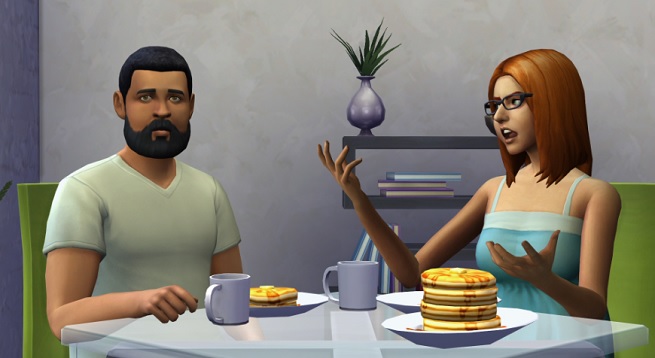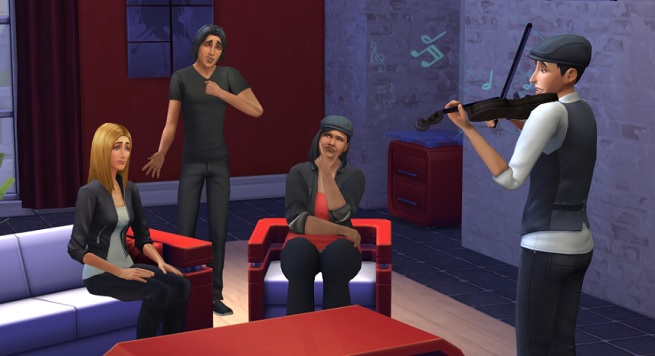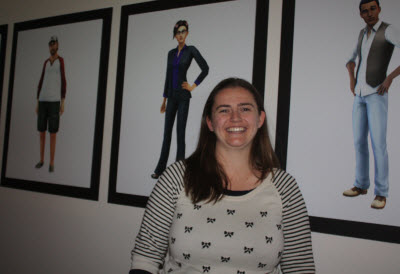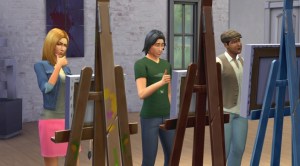GamesBeat: How do you make some of the decisions around things that affect the perceptions of gender in your games? I think of things like how much nudity do you use in showers and stuff like this? On some level, parents may feel like this is a game for kids, but it has nudity and sex. All these things are part of real life but aren’t necessarily shown in games. How do you decide what to include and how to handle it?
Pearson: For The Sims, a lot of it has to do with this core set of brand values we’ve defined over time. The Sims is an optimistic view of life. It’s a lighthearted take on reality. It’s still a game. We’re not striving to be a photo-realistic simulation of everything about life.
For that reason, there are certain conceits we’ve historically made because it’s just “Sims-ey.” We use that word all the time. Some things are Sims-ey. Censoring them in the shower, for example, is a choice that we made ages ago, and it’s remained true, because it supports the line drawn between you directing these little people in the world and them having some amount of privacy from you. It’s a Sim’s way of telling you, “Hey, this is my private space. You can’t see here.”
As for other decisions about how we decide what we’re showing or not showing – how we pick clothing, for example – all of that is approached equally across the board. We say, “Hey, we’ll make skimpy bikinis for girls because everybody wants those. Well, guys totally need Speedos, too.” We support both, because we want to support all types of stories.
It’s fun to get into those conversations. The male pregnancy is a great example. We had that in Sims 2. It’s one of those things we all laughed about, but we’re like, “Why not? We can do that.” It was funny to tell the story from that point of view and give people more space to do interesting things and push their Sims in different directions.
GamesBeat: Where do some of the players come in and push you further in other directions? Do they make you think more about some of these issues?
Pearson: One interesting anecdotal example. In The Sims 4, we’ve introduced a lot of body modification. Something that gets harped on in games a lot is boob sliders. They’ve been quite a point of contention in other games. Well, what we find interesting about our audience is that we’re very mixed. We introduced these sliders for body shapes, and the women in our audience are way more excited about the boob sliders than our male audience. They can re-create themselves and people that they know. They wanted that control to be able to make different body shapes. It just means different things in The Sims, and I appreciate that.
We’re saying that this is about creating anything you can imagine, about telling any story you can imagine. Our tools mean different things. It’s kind of a subtle jab at everything else, but I like it. It’s a subtle point. For us, this tool is important, because it lets you build who you want to create. The arguments against other games have always been, “It doesn’t really matter, because it’s clearly just gratuitous.”
It’s fun to see our super-vocal community coming out on the boards and saying, “We need more boob shapes! We need more butt sliders!” All right, guys, we’re working on it. And it’s not because they’re looking to make crazy-looking characters. It’s because they’re trying to realize actual replications of people they know, or of themselves. That’s really cool.
GamesBeat: So you have more elevated discussions of issues than a lot of games have.
Pearson: [Laughs] I’d like to think so. We have lots of conversations about how to emulate realistic body types. How do we emulate realistic relationships? We talk about a different level of stuff than sometimes people may think.
It’s a fun part about being here. There are obviously different experiences, when you talk to a woman on the team or a man on the team — the things they remember growing up and the like. Maybe a woman remembers being a girl and having her hair braided. We think, “OK, is that a moment we want to have in The Sims? How would we do something like that?” It’s nice to have all those different story inputs, so we can figure out how to better represent the breadth of life that everyone wants to enjoy in the game.
GamesBeat: Gender issues came up a couple of times in the last year in big ways. Anita Sarkeesian did her video series, talking about tropes in stories for video games. She brought up one interesting subject about The Last of Us and how even if you see Ellie as this fantastically realized character in the game, she still fits into a certain pattern of having to be rescued by the man in the game so many times. It’s one more story that fits this established pattern, that women in games are always there to be rescued. How do you feel about some of these discussions that have been happening?
Pearson: The conversation that’ll continue to occur is going to be part of moving things forward. Even coming at it from all these different angles, making it a topic that people are aware of and thinking about continues to push it forward. You do see parallels to this in the TV and movie industries. I happen to be a big follower of Joss Whedon, and he gets comments about this all the time — “You have such strong female characters.” His point is, “I’m going to keep doing this until people stop asking me why I have strong female characters.”
It’s the same kind of thing you see in the game industry. We’re going to run into that for a while. We’ll put these kinds of women in games and we’ll talk about it. Games are inching toward being more interesting and more diverse, which is wonderful. At some point we’ll get to where people don’t talk about it anymore. It won’t be about whether a character is a man or a woman. It’ll just be about whether they’re interesting or not.
The conversation continuing to occur is an encouragement that we’re going in the right direction. Hopefully people just keep pushing that envelope.
GamesBeat: The interesting thing about the Naughty Dog guys is that they said they were surprised about how people dwelt on the notion that there’s this sexist storyline in the game, because they tried so hard to realize the women in the game. They’re not unaware of the issue, but they’re trying to make something different from what people had seen before. The response could be, well, they shouldn’t have been surprised. Maybe somebody on the team who was there might have pointed that out before they started down that road. I don’t know.
Pearson: It’s an interesting line. There’s a level of — if you push too hard to not do a thing, you might be perceived as doing it anyway. The balance is hard to strike. I appreciate people trying to push that line. It’s important that we keep trying to get to that place where it’s just about interesting stories, and it isn’t a question of whether, because a woman did one thing or another, it’s just the same old story. I hope that we can continue to get better at that.
GamesBeat: There was also the Twitter discussion, the “Reason to Be.” What was interesting there was that it didn’t seem to be sparked by anything in particular. There was just an expression of dissatisfaction with the state of things, the gender gap, that we have a long way to go.
Pearson: I have a lot of friends who were involved in following that, a lot of women I’ve worked with throughout the years who are now at other companies. It’s still a very challenging environment out there for women in game development. It’s still a hard club to get into for any developer, let alone women trying to get in. The amount of women out there trying to get into the industry is still pretty low, so our representation isn’t as high as we’d like it to be. That’s why we’re trying to encourage younger girls to come up through those ranks and learn more about the industry.
It’s going to take time for people to break some of the patterns they’ve followed for so long. It is an exciting industry to be a part of, and it’s a very challenging industry to be a part of. That’s true for men and women. Because women are still a lower percentage of that group, though, there are some challenges that we face on the whole that are a little bit different.
It varies from company to company, just like you were saying. Some people think it’s great. I think the Sims studio is one of the best places for that balance right now. I feel very lucky to be part of this studio, for that reason. I feel very supported. I feel like I’m part of the whole. We do a great job with what the women in our studio do and what our game does.
I could absolutely see how, at other companies, it’s a different culture and a different way of working. When I first joined QA here, the QA department was dominated by men who wanted to come in and play games. I remember having a conversation where someone said, “Are you going to be okay, being the woman on the team?” It surprised me, because I was like, “I play games with guys all the time. What do you mean?” But it definitely is something people are conscious of. Those challenges have not gone away yet. We’re still working toward that.




